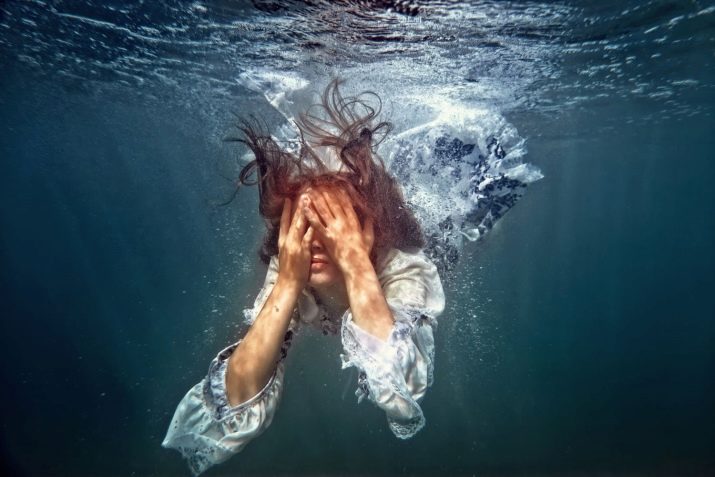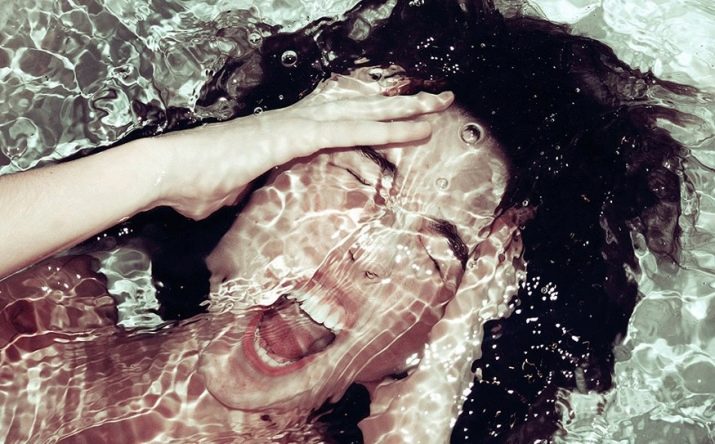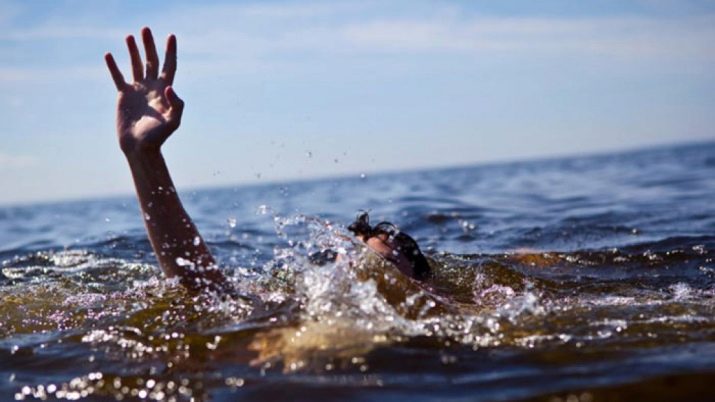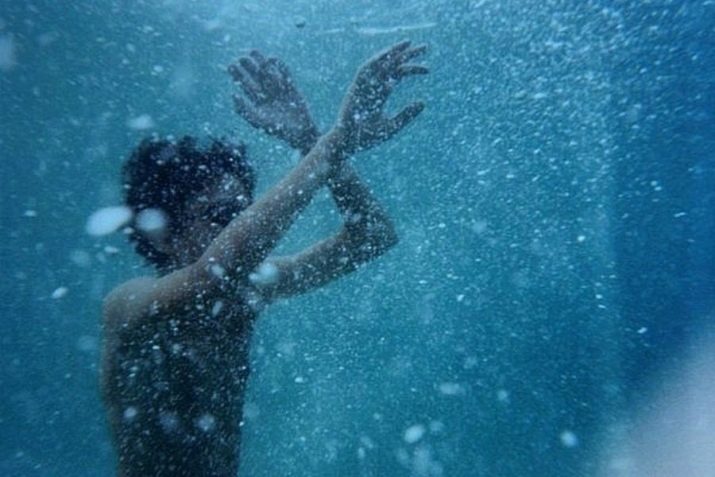It’s good when there is an open pond nearby, you can swim and frolic in it. Everyone dreams of such a pastime. But just not everyone likes to swim in dangerous places - where it is very deep. And this is normal fear, since a person has a sense of self-preservation.
But there are people who are simply panicky afraid to go into the water because of an inexplicable fear. Such personalities are called bathophobes.

Features
There are various phobic disorders associated with water, among which bathophobia is most prominent. This fear is associated with a fear of depth and is one of the manifestations of the fear of death. Human beliefs say that before his death a person often dreams of how he drowns and is absorbed by a dark abyss.
Without water, no living creature can live long. In summer, everyone wants to go on vacation at sea. But, despite this, people are desperately afraid of the water element. And not without reason: when it becomes uncontrollable, it can take many lives. Therefore, man has long since learned this lesson and is trying not to cross the safety line. And this is quite normal.
Another thing is when a person has a tendency to obsessive states. When in the water, he begins to panic, and this condition causes disorders in terms of health. As a result of stress, such a swimmer can drown, even if he knows how to swim well.

And all this will happen because he will quickly develop an irrational fear that can “fetter” all his thoughts. Then he will simply lose his orientation in space, and everything will end tragically.
There is another category of people who has a very rich imagination. And this series of individuals is prone to phobic disorders. After watching movies where people fall into a storm, and their ship begins to sink, and terrible waves absorb everything in their path, they begin to imagine themselves in the place of these people. Decisive and impressionable persons are so included in the situation of passengers in distress that they can no longer control their emotions. The result is a panic that occurs out of the blue.
Batophobia only at first glance does not seem to be a very dangerous disease. To avoid her just do not get close to those reservoirs where it is very deep. Nevertheless, an individual with a frustrated psyche will find a reason for panic. And such manifestations can seriously affect his health.

Kinds
Fear of depth is divided into two main categories.
- Objective - with it, a person is really in danger. For example, when he got into a whirlpool and he can be pulled to a depth any minute. An objective fear of depth may also arise if the vessel on which people are located is in serious danger. Then a sense of self-preservation triggers, and general panic begins on the deck.
- Destructive a phobia occurs as a result of obsessive thoughts that may arise when an individual is at a depth. Perfectly keeping afloat, a person suddenly begins to simulate various negative situations and thereby winds himself up. For example, it seems to him that during swimming he will have a cramp, and he will quickly sink to the bottom.
In other cases, having seen enough of the various programs that tell about floods, the individual, sitting at home on the couch, imagines that now he will be covered by an uncontrollable wave. As a result of his invented phobia, he begins to fight in hysteria, and this attack is pretty hard to stop.
This case is the worst. And if such manifestations are observed, it is necessary to seek the help of a specialist.


Symptoms
In severe phobias, fear of fear of water may appear even when there is no reservoir nearby. It’s just that a person begins to gradually wind himself up and present negative consequences from being able to get into the center of the maelstrom. This individual turns in his mind non-existent moments, develops the severity of the problem instead of calming down.
As a result of such actions, the body of the batophobe starts a process that provokes the release of a huge amount of adrenaline. The brain cannot handle it. The result of this is the failure of all systems of the human body. Then there are changes provoking the following symptoms:
- breathing becomes intermittent;
- dizziness and a sharp headache may begin;
- pressure surges occur - it either rises significantly or decreases;
- thirsty;
- nausea or lump comes up to the throat;
- sweating of arms and legs is significantly increased;
- often there is double vision;
- disorientation in space begins.
These manifestations are very dangerous for the health and life of the patient, so it is necessary to take measures to eliminate phobia and establish the work of the whole organism as a whole.

Causes of occurrence
Most phobias come from childhood. And if a person has a very anxious and suspicious temperament, then the risk of phobia only increases. And the character is laid in adolescence. When when a child was abused by adults, did not communicate with his peers, or, conversely, often fell into bad companies, it is likely that in adulthood this person will undergo some kind of phobia.
Of course, if the life of this individual is very good (there will be no stress and various negative stories), he will try not to recall bad moments from the past. They will not be able to influence his mood.However, in fate there are troubles that can not always be overcome and cope with them yourself. For example, there is a terrible dream, where a person is drowning in the dark depths, and he is very similar to reality. And then the stressful period begins, which leads to an obsessive state.
A person who has a very persistent character and makes strong-willed decisions is able to avoid severe depression. With the rapid disappearance of such a period, the phobia may not appear. However, there are several other factors that can trigger a fear of depth.

Negative experience
The development of such a scenario is not excluded. Water troubles can happen to everyone. For example, some butophobes became addicted to fear after experiencing a cramp while swimming in the sea.. When such a situation occurs and life is "in the balance", then a person already knows in advance what will happen to him if the tragedy happens.
Choking on water and losing consciousness, a person gets enormous stress. At the time of salvation, he is brought back to his senses, and the individual involuntarily once again “scrolls” in the consciousness the tragedy that happened to him. And then comes the realization of what could happen to him next if they had not saved him. Realization of near death can lead a person to madness.
People who have experienced such emotions can never forget this horror. He will emerge in consciousness again and again. This triggers a sense of self-preservation. For some individuals, this fear will remain simply fear and will not develop into a more serious condition. Other people who are predisposed to obsessive moods may experience frequent panic attacks.
Therefore, in any case, when a person has been exposed to risks to his life, including bathophobes, psychological rehabilitation is needed. And the sooner work begins to eliminate psychological discomfort, the faster the failed drowned man will restore his normal mental and physical condition.

Inability to swim
Not all people know how to behave properly on the water. They do not realize that the elements can be dangerous, so they often put their lives and the lives of others at risk. There are times when friends throw their comrade into the water for fun. They don’t even think that a friend cannot swim. Once in the depths, a person begins to sink and call for help. There is a panic.
Not the fact that his friends also know how to swim well. While everyone is looking for help, the victim manages to choke and go to the bottom. After salvation, such an individual will put his feelings in order for a long time and this is why: the fall into the water occurred suddenly, and as we know, the suddenness of the accident significantly affects the development of a negative state.
Irrational fear arises suddenly, cannot be explained. And an unforeseen case, when a person does not expect anything bad, also arises suddenly. And this relationship is fatal.

Features of the nervous system
They are also of great importance. Weak and impressionable individuals are always more prone to phobias. As soon as they watch a horror movie or a documentary plot about how people are drowning and dying, they begin to project this negativity onto themselves.
Such people have enough seen the picture. After that, their fears gradually develop into a more serious condition. When approaching an open source of water, they remember the movie they watched and they think that the abyss will now absorb them.
At this moment, phobic tendencies arise in the human mind. And if he is not able to keep his emotional state in the right direction, then fear will develop very quickly and develop into a tantrum.

Methods for getting rid of a phobia
There are many ways to overcome phobic disorders.
Psychotherapist's help
Phobia treatment is necessary only with the help of an experienced psychotherapist, who will first identify the cause of the fear, and then pick up individual therapy.
- Hypnotherapy. It implies psychotherapeutic work with a person to whom an altered state is imposed, and then his consciousness is subjected to external suggestion. The hypnologist inspires a person that he is no longer afraid of depth.
- Cognitive Behavioral Therapy (CBT) is a form of psychotherapy. It lies in the fact that psychological problems and neuropsychiatric disorders are altered by the joint and specific work of a specialist and patient. Batophobe tells his fears, and the doctor corrects his thoughts using a special technique.
- Autotraining It also helps to relax a person’s consciousness and tune in to positive.
- Neuro-Linguistic Programming - This is part of practical psychology that develops applied techniques that adopt the experience of psychotherapists and communication masters. Verbal suggestions can make the individual cease to be afraid of deep water.
- If the disease is serious and has a neglected form, then drug therapy is prescribed. Only this issue should be decided by an experienced specialist, otherwise uncontrolled intake of drugs will lead to unforeseen consequences.


Learning Positive Water Information
In addition, you can use parallel methods to reduce anxiety. You need to watch more programs about the deep sea or about those inhabitants that are found in rivers and lakes. You just see the underwater world and look at the water with different eyes. The element of depth is so rich and colorful that you will not have more thoughts about fear of this miracle of nature.












